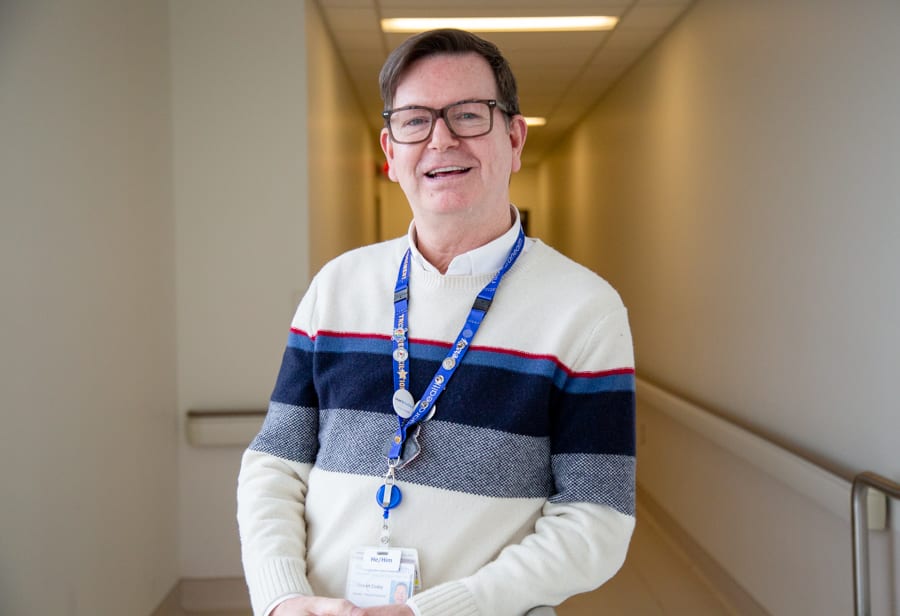We are Niagara Health is a series of stories that celebrates the incredible people working and volunteering in our organization and how they make a difference in the lives of patients and coworkers every day.

Robert Cosby is Niagara Health's Director of Patient Experience. He will work with patients, physicians, staff and members of equity-deserving groups to ensure safe and high-quality healthcare for all.
When Robert Cosby’s mother was diagnosed with Stage 3 cancer, the care she received at the Walker Family Cancer Centre was nothing short of kind and compassionate.
“They didn’t treat my mom like she was a sick woman,” says Cosby, Niagara Health’s Director of Patient Experience. “They treated her like a human first.”
That hasn’t always been Cosby’s own experience when he’s had to access healthcare himself outside of the organization. The care he’s received elsewhere as a queer man in a same-sex relationship “hasn’t always been great,” he says.
“I’ve had some positive experiences and some not-so-positive experiences. If we look at the research, when you consider the social determinants of health for people from equity-deserving groups, their experiences haven’t been great. We need to make it more positive.”
That’s something Cosby has been working toward since he became Director of Patient Experience last summer. It’s a new role to Niagara Health, in keeping with the Strategic Plan, Transforming Care, which emphasizes safe and quality care, putting people first and transforming how we work.
“This really is my dream job,” Cosby says. “This is changing the face of healthcare and Niagara Health, and looking at what we’re doing well and what we can improve upon in a significant way.”
To accomplish that, he’ll do surveys, look at trends, work with individual departments within the organization, and hear directly from patients, physicians and staff for input on how to make healthcare more equitable for those receiving treatment and those providing care.
“We really have to rally around staff and physicians and make them feel psychologically safe, emotionally safe and provide them the resources to live our vision of extraordinary caring, every person, every time. It’s a collective. We’re going to co-design what this looks like,” Cosby says.
“As an openly gay person, an openly queer person, I never thought I’d have the opportunity to go into a position to effect change that could impact so many people."
He’ll also take cues from the Patient Experience Committee and Patient Partners in the Niagara Health Engagement Network, which Cosby oversees, Indigenous partners and other equity-deserving groups in order to understand their experiences and how to improve.
“Health equity impacts a person’s experience when engaging with healthcare,” Cosby says.
He learned that as he wrote his undergraduate thesis while studying social work in university, which examined the experiences of same-sex couples in long-term care.
By the time the ink was dry on his paper, Cosby had chosen his career path. He wanted to be a social worker in healthcare and represent the 2SLGBTQIA+ community.
Cosby wears his pronouns and a Pride pin on his lanyard, along with other symbols in support of equity-deserving groups. They’re gestures meant to create a sense of safety for those who have lacked it for so long in healthcare.
There was a time, however, when such signals were hard to come by, including at Niagara Health when Cosby started here in 2017 as a clinical manager in Mental Health and Addictions.
He recalls not having the same sense of safety he has today, thanks to the efforts of the Diversity, Equity and Inclusion (DEI) Committee, which Cosby helped found and co-chairs, and the committee establishing Diversity Month celebrations in April and Pride in June.
The fact he could be interviewed for his latest role as an openly queer person is a sign that important strides have also been made, he notes.
He credits a core group of colleagues at Niagara Health for helping to create a safe space for him after he was hired and leading up to the DEI Committee’s creation.
“I was always targeted as being gay from a young age. That trauma sits with you and when you go into a new environment, you’re always scanning,” Cosby says. “I felt comfortable with these colleagues. You don’t always know who you can talk to and it’s that psychological safety we’ve really improved on in the last few years.”
These days, Cosby couldn’t be more excited by the opportunity that comes with his new role – or determined to use his own experiences to be a change agent for people from equity-deserving groups receiving care at Niagara Health.
“As an openly gay person, an openly queer person, I never thought I’d have the opportunity to go into a position to effect change that could impact so many people. Now that I’m in the position I’m in, it’s an opportunity to address things when I hear about inequity or experience inequity. It’s a real opportunity not just for the queer community but all communities. Because I’ve had my experiences, I think I can empathize with others,” Cosby says.
“I want people to know there are people like myself in these positions who are trying to pave the way for our community,” he adds. “I’m determined to do that.”

